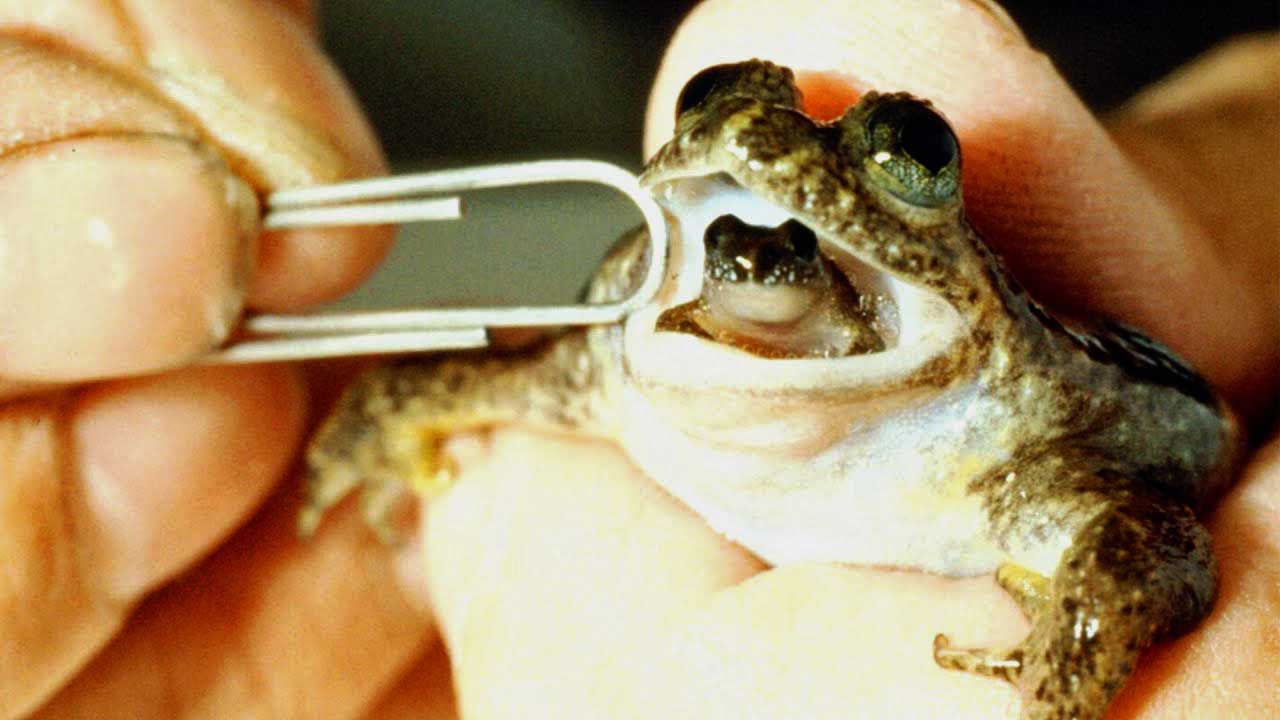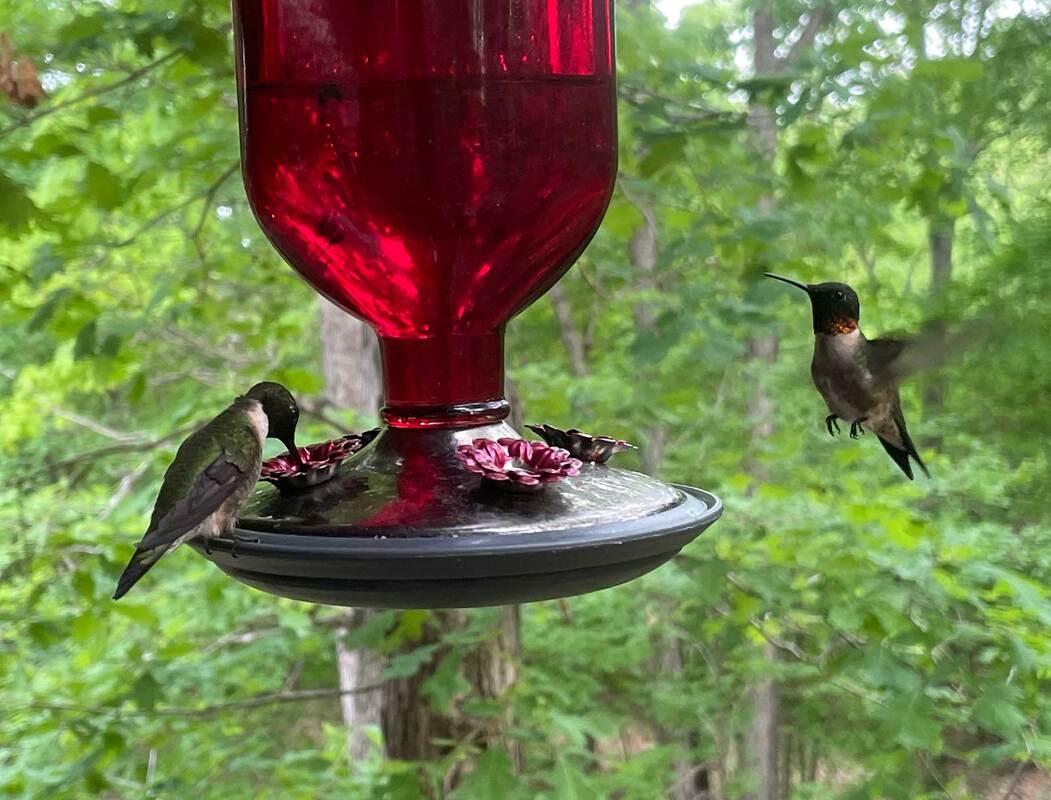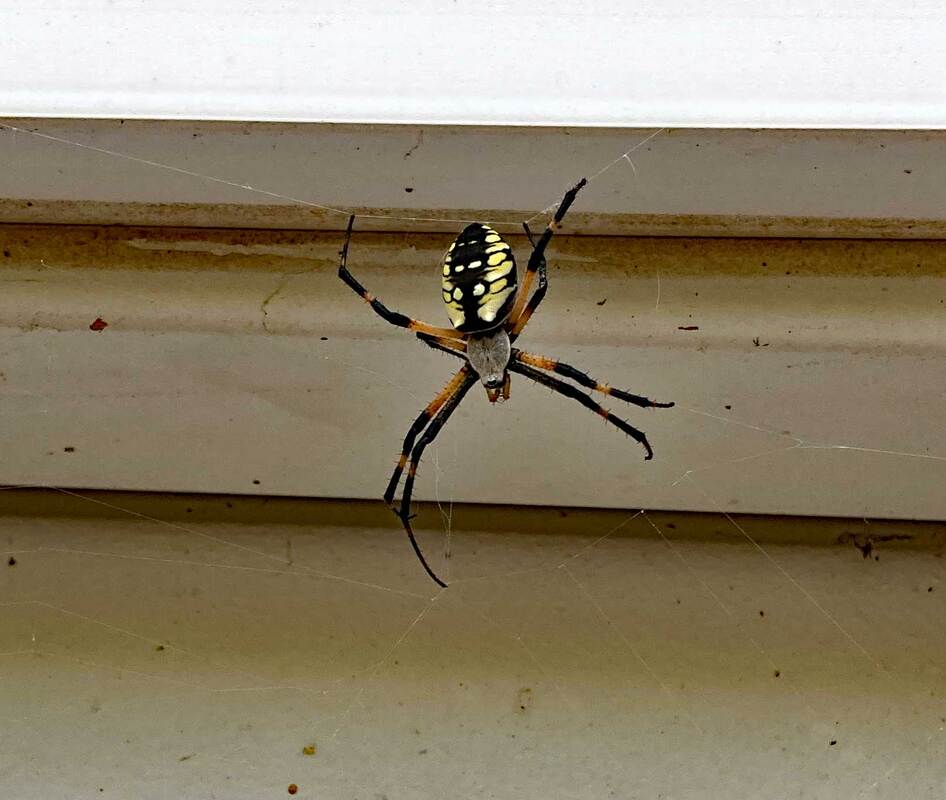|
Did you know the now extinct gastric-brooding frog barfed up its babies? Yep, two species of these frogs, which lived in Queensland, Australia and became extinct in the 1980s, were unique among frogs because they incubated and hatched their eggs within the female's stomach. Really.
Let's break it down. Like other frogs, female gastric-brooding frogs laid their eggs, then the males fertilized them outside of the female's body. That's just how frogs do it, and it's normal. But then, with these frogs, things got strange. Next, the females swallowed the fertilized eggs... about 40 of them! Hey! Wouldn't the female's stomach digest the eggs and kill them? Sure, except that these frog eggs secreted a chemical that made the mother's stomach stop producing hydrochloric acid. Well, that means the mother couldn't eat anything the entire time the eggs were incubating in her stomach and while the baby frogs were growing—more than six weeks. Obviously, the mother's stomach got pretty large as the young grew. So large that her lungs were smashed, and she had to breathe through her skin instead. When the babies became fully-formed frogs, the mother would barf them up, usually one at a time. But, if the mother was disturbed by something, she would projectile vomit all the babies out at once. Unfortunately, gastric-brooding frogs went extinct due to human destruction of their habitat and human introduction of a disease-causing fungus. Amazingly, scientists are making good progress in bringing these frogs back, using a specific kind of cloning called somatic-cell nuclear transfer. In fact, in 2013, they produced a living embryo using preserved tissue from dead gastric-brooding frogs. That embryo didn't survive, but one of the scientists has stated: "We do expect to get this guy hopping again."
0 Comments
Time is weird. I’m going to use a Steve Martin quote, from the movie The Jerk: “I know we’ve only known each other for four weeks and three days, but to me it seems like nine weeks and five days. The first day seemed like a week. The second day seemed like five days, and the third day seemed like a week again, and the fourth day seemed like eight days…”
You get the idea without seeing the entire quote, right? If time wasn’t weird, science fiction authors (like me) wouldn’t write about time travel so much. It’s just weird. How many people have you heard say that time seems to be passing faster as they get older? Everyone says that, except for babies. Obviously, time doesn’t really pass faster when we get older. If it did, old people would be way out in the future and young people would be stuck in the past. It’s more about perception. For example, my 63rd year seems like 213 days, and my 64th year will seem like 189 days, and my 65th year will seem like 151 days, and… you get the idea. Why do we have this perception? To understand this, I’ll refer to Psychology Today, which uses a camera, film, projector, and movie as metaphors to represent visual memory. Consider the frames in a movie. If the camera captures more frames per second, and you play it back at a standard rate of 20 frames per second, the picture seems to be in slow motion. If the camera captures fewer frames per second, and you play it back at the same 20 frames per second, the picture appears faster than real life. Here’s the kicker… as we age, the visual part of our brain captures fewer visual images per unit of time. We simply have fewer visual images of what is happening around us. Therefore, we have fewer visual memories to draw from as we think about recent events. More actual time passes between the perception of each new mental image. When children remember things, they have more visual images of those events, therefore it seems like those events took longer. Now I understand why I used to always say, “Are we there yet? Are we there yet?” Life's Great Mysteries - Why do hummingbirds fight over the feeder when there is enough for all?10/11/2023 This mystery comes to me every time I watch the hummingbirds at our feeders. You may think of hummingbirds as cute, docile, innocent little fairy-birds, but I’m here to set the record straight. Hummingbirds are mean, grouchy, stingy, food-hoarders. Of course they're still cute, and we like to watch them. However, if they were the size of eagles, they'd be terrifying sky-demons. Trish fills our feeders whenever they get low. That means the hummingbirds will not run out of food. Ever. There’s plenty for all, including the hummingbird brothers, sisters, cousins, friends, acquaintances, and total strangers. No need to be stingy. There’s no purpose in sitting near the feeder and dive-bombing every other hummingbird that tries to take a sip. There simply is no point in hoarding an unlimited resource. Well, as it turns out, this unlimited resource thing is the key to hummingbirds’ contentious behavior. Hummingbirds simply cannot fathom that such a thing as an unlimited resource could possibly exist. They did not evolve feeding on unlimited food. If they had, the world would be filled to overflowing with hummingbirds, and nobody wants that. Hummingbirds feed on nectar, and flowers tend to bloom and produce nectar for a short period of time. The next flower, or group of flowers, may be some distance away. So, throughout all of hummingbird history, about 22 million years, these little bullies have been viciously guarding their food, to make sure they have enough to survive. Photo Credit: Ruby-throated hummingbirdss at feeder - Stan C. Smith Did you know blue jays often mimic the calls of hawks, but no one really knows why? Blue jays, extremely common birds throughout the eastern half of North America, have a reputation for being bold and raucous. Despite their reputation, though, there's no denying that they are stunningly beautiful birds.
Blue jays are especially skilled at mimicking red-tail hawks and red-shouldered hawks, but they also mimic broad-winged hawks, Cooper's hawks, ospreys, kestrels, and bald eagles. The question is... why? No one knows for sure. Here are some of the suggested reasons: 1. To attract a mate Blue jays often imitate hawks during mating season. Maybe part of impressing a mate is to demonstrate that you can imitate a variety of different calls...? 2. To defend their territory Blue jays hate other animals coming near their nests, so maybe mimicking a hawk might scare off potential nest invaders. 3. To let other blue jays know a hawk is nearby Hawks prey on blue jays. So, what better way to warn other jays that a hawk is near than to imitate a hawk call. Assuming, of course, that other jays can tell the difference between a fake hawk call and a real hawk call. 4. To fool other birds into thinking a hawk is near Blue jays are mischievous, right? Why wouldn't they scare other birds away from a food source, to get all the food for themselves? People have actually observed blue jays mimicking hawks to make other birds drop bits of food, then the jays swoop and steal the food. Hmm... I'm leaning toward #4. In my opinion, blue jays are definitely sneaky (and smart). What do you think? A black and yellow garden spider has made a long-term home at the top of our garage door. It has been hanging out there on its web for several weeks, and it's getting rather fat from eating the bugs it catches in its web.
Black and yellow garden spiders typically live in grasslands, but they adapt well to living in gardens and on the sides of human-made structures. Although these large spiders produce venom to subdue their insect prey, the venom has almost no effect on humans, so they are considered harmless. Gardeners like having them around, as they consume a variety insect pests. When an insect gets caught in the web, the garden spider will shake the web with its long legs, further entangling the insect. The spider injects its venom, paralyzing the prey, and wraps it in webbing, then leisurely sucks up all the juices, leaving only a dry husk. The spider, being a fastidious homemaker, will repair the damage to its web before settling in to consume the insect. These spiders usually create a web and then stay in that same spot for the entire season. |
Stan's Cogitations
Everyone needs a creative outlet. That's why I write. Archives
July 2024
|






 RSS Feed
RSS Feed